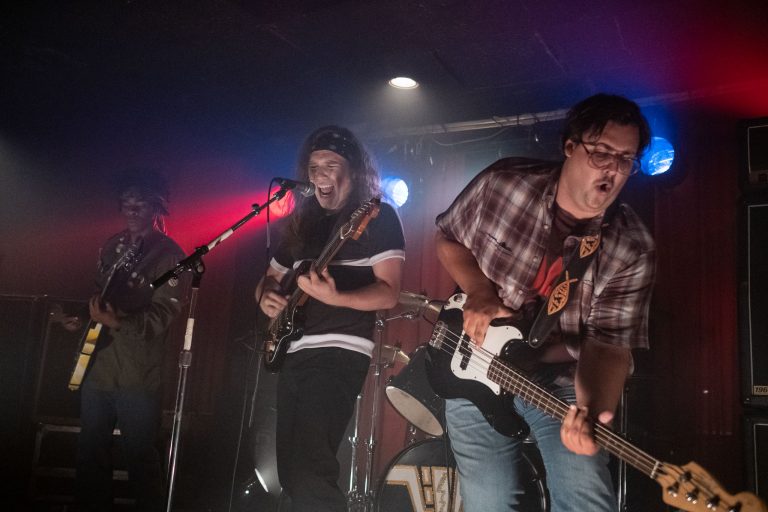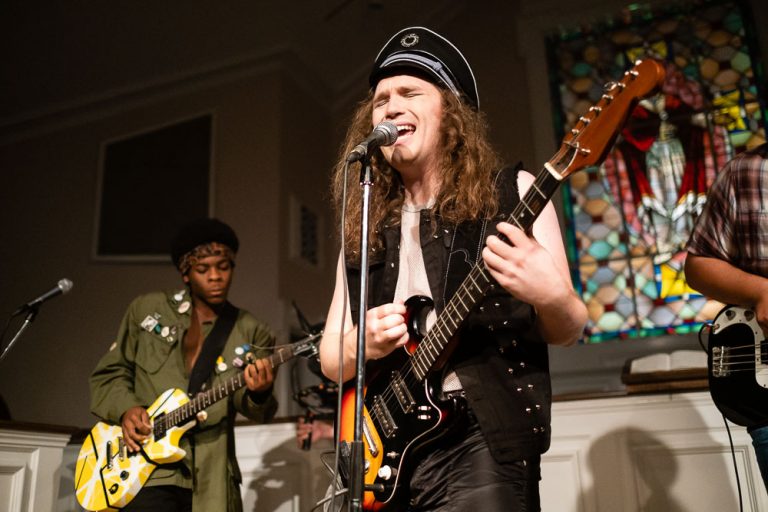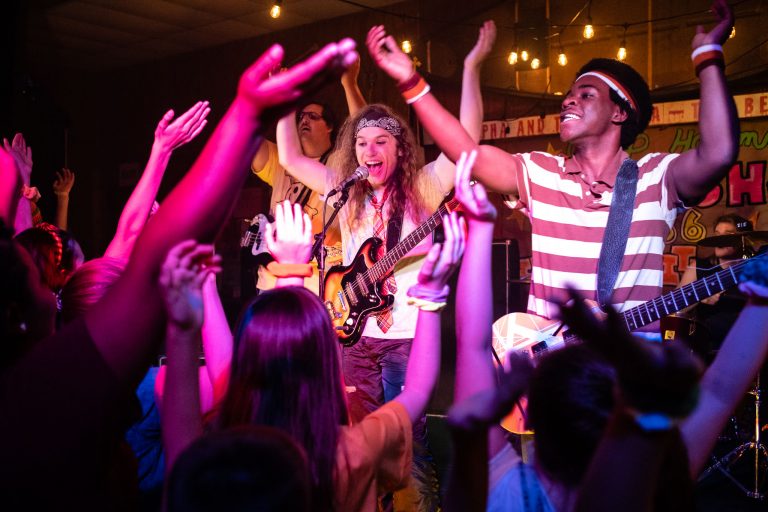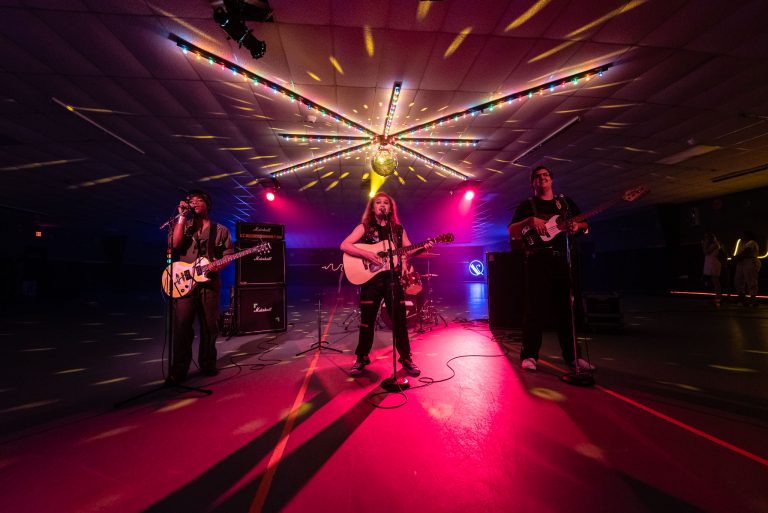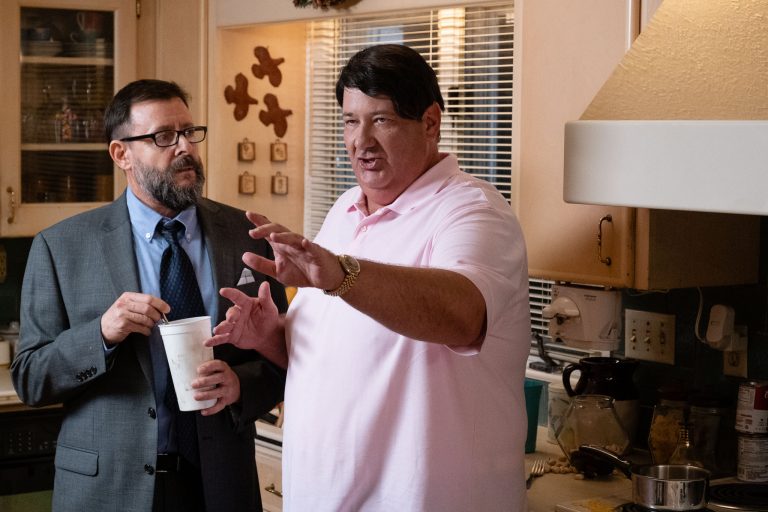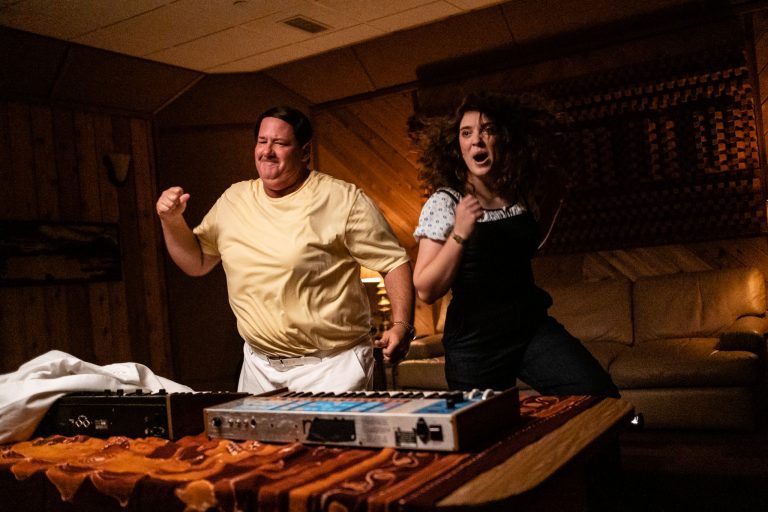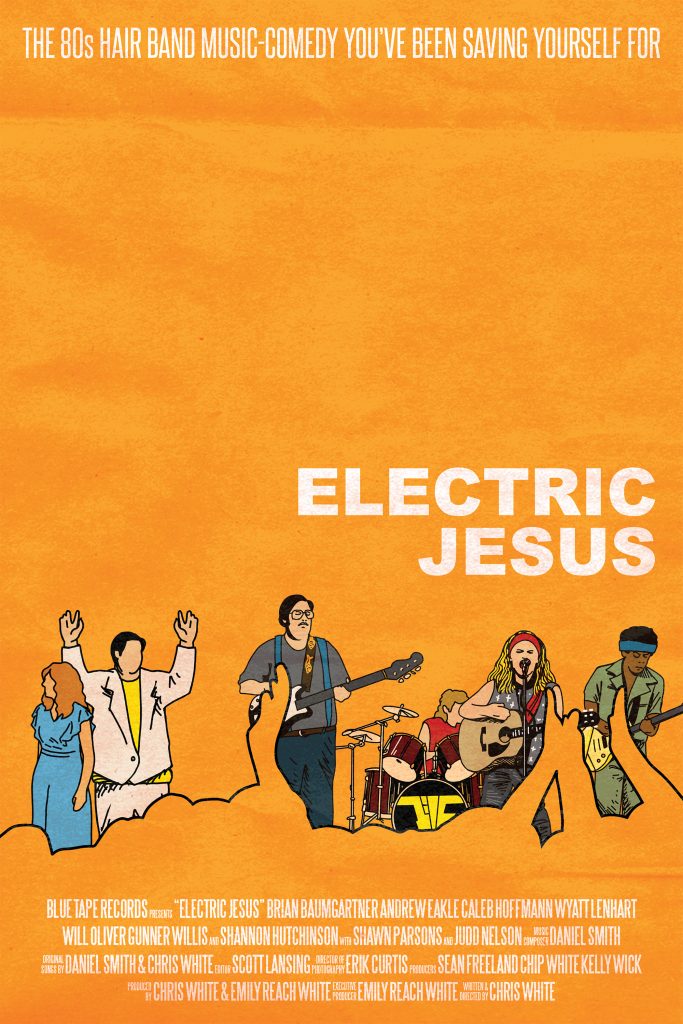
Not every plan is meant to work out. Not every love is meant to last. Not everyone can be the protagonist. And not every band is meant to become famous. And yet, sometimes the true story of triumph lies within the story of almost.
This journey is precisely what Writer and Director Chris White set out to capture in his film, Electric Jesus. Set squarely in the mid-1980s, the film follows a Christian heavy metal band’s quest for fame, or more accurately, to make Jesus famous.
Told through the eyes of the band’s earnest yet naïve soundman, Erik (Andrew Eakle), the teenage group 316 is presented with an opportunity to go on tour for the summer when manager Skip Wick (Brian Baumgartner) promises to make them as famous as their favorite band, Stryper. The group travels the southeast, playing church camps, fellowship halls, and roller rinks in their ill-fated search for stardom.
Along the way they gain a stowaway, bluegrass gospel singer Sarah (Shannon Hutchinson) who is equally, if not more talented, in her own right. What happens next on their supercharged voyage to inevitable disaster, explores just how far the group is willing to go for fame. ElectricJesusFilm.com
Write what you know
For White, delving into the world of fellowship halls and hair bands was a natural choice. Believing that a story is most authentic when you write what you know, White drew from his own experience in order to orient the journey of 316.
“Growing up in that evangelical youth culture in the eighties was really important to me, it was a charming, cool part of being a kid for me,” he recalls. However, not all of art imitates life. White cites his time working with an improv troupe as the closest experience he’s had to being in a band, saying, “I’ve never had the patience to master any kind of instrument, I just loved a lot of music.”
This love of music sparked a songwriting partnership for White and composer Daniel Smith, who created all of the original music for the film, including 316 hits like Barabbas, Commando for Christ, and Girl (I Love Jesus Too). These songs embody stunning juxtaposition of the film itself: a delicate balance between parody and sincerity.
“I think they’re sincere about it, but they’re kind of childlike, and naïve, but sweet, and ridiculous, all at the same time. So, when Chris and I were talking about the music part of it, I thought it’d be really interesting if they just through their kind of naivety, turned out to be great songwriters. The goal was to try and make music that surprises the audience, that there’s some melodies and some things in there that the audience ends up kind of liking, and are surprised by that reaction,” says Smith.
When working on the sound that would eventually become 316, Smith did some time traveling of his own. “There was probably about a month of listening to mid-eighties heavy metal, just to get into that headspace, and to see what I liked now,” he says. “The intention was to try to write songs that before you even hear it, if you’ve heard Christian hair metal, most likely you’ve cracked a smile and are expecting it to be god-awful. And it has some of that, but hopefully it has a bit of subversive, ‘hey I can’t get this song out of my head’ to it,” he continues.
Forever Young
When considering the power of nostalgia to draw an audience into the world of the 1980s, it’s hard to nail down what exactly makes the era so impactful. “For those of us in GenX who were growing up in the eighties, we’re at an age now where we’re remembering and reflecting and wistful for simpler times. There’s something comforting about a time when technology is not so ubiquitous, where we’re not structuring our lives and work around it, like we do now,” explains White.
“For me, growing up in the 80s, I think that genre is so interesting because the high school years are brutal, as we all know, and it’s at a time where young people are excited, and scared, and impressionable, and fragile, and overly confident and all these things, and everything’s hyper-emotional. I think that combination of music with the high school years is a perfect combination,” says Smith.
“I think the sort of hair band element of that time was a fun time period to set it in, a time that was potentially more innocent in a way, nobody had cell phones to be able to connect all over the world with the click of a button, so you’re able to tell a more specific, insular story,” muses Baumgartner. When viewing the eighties from the perspective of the younger band members,
Eakle believes there is an additional reason for its impact. “I think for our generation it’s always fascinating, the time that existed just before you were born, because the remnants of that time are still ongoing as you’re growing up,” he says.
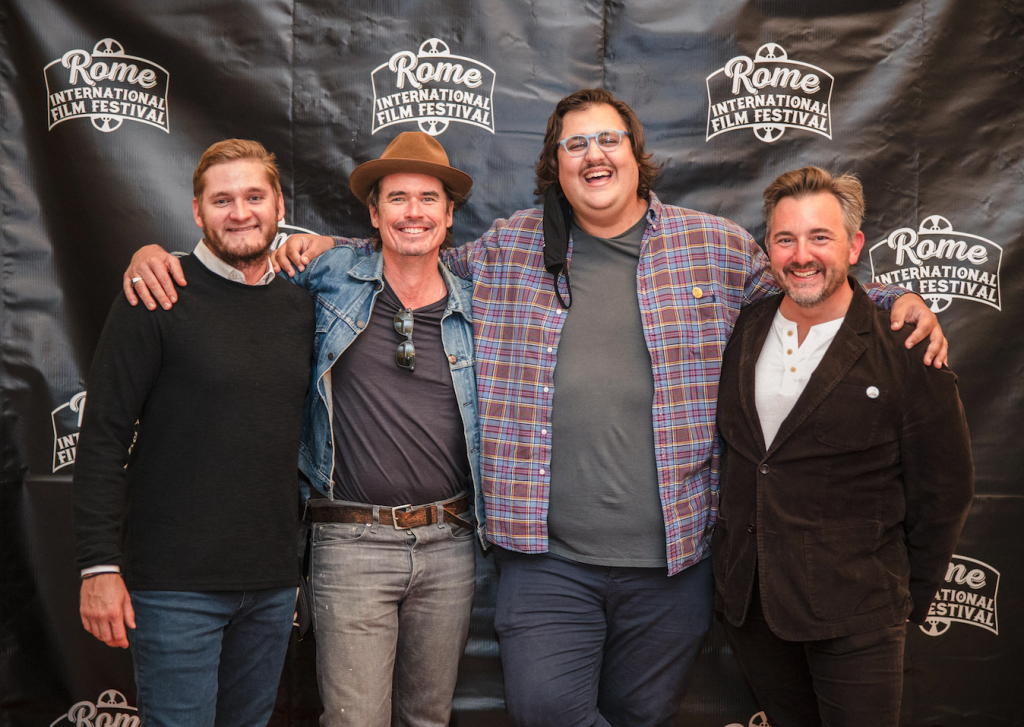
Our House
Throughout their time filming, members of the cast developed a bond that shines evident and injects their performances with a sense of fun that can only come from genuinely enjoying one another’s company. “Prior to shooting the movie, I think our relationship strengthened organically,” says Eakle.
“I think it’s a testament to Chris’ ability to foster these relationships.” Add a shared living situation into the mix, and the bonding only continues. “Living in the house together, so many fond memories, so many crazy moments, ridiculous moment, sweet moments that I’ll never forget. It was a family, and really felt like being part of a band. We lived together, we rehearsed together, we ate together, we watched tv together, it definitely strengthened the comradery and the onscreen chemistry as well,” says Eakle.
Was that you who just created a party out of thin air?
While the chemistry between bandmates had already been established, White was very intentional about bringing Brian Baumgartner into the production dynamics. “I’ve always heard stories about Robin Williams in the cast of Dead Poets Society, befriending and mentoring the other young actors and that’s what I wanted Brian to do,” he says.
“That could have gone badly, if he wasn’t so cool. He came in, and he was just one of them.” To ask White, the moment when he knew the cast was all going to gel involved Caleb Hoffman, who played Scotty, the band’s drummer, transfixing Baumgartner with a magic trick. “From there, everything was fun. Everything was a joy after that,” he recalls.
Eakle also recalls a moment when Baumgartner dropped by the cast house only to discover the group watching an episode of The Office, the show that Baumgartner is most known, and beloved, for. “He was cool about it, he sat down and gave us a commentary on what was going on behind the scenes, how hard it was keeping a straight face during this particular moment,” he says.
From Baumgartner’s perspective, he was equally invested in fostering relationships with his castmates. “Chris wanted me to bond with them, that was important, and I just really liked them. Any way that I could help them, or fight for them, or support them in any way that just happens on a day-to-day basis on a film, was what I wanted to do.
They were all as invested in trying to create cool characters and work together very hard on the music, singing and dancing, it’s not easy to do, so it was my pleasure to support as much as I could. It doesn’t take any more effort, and there’s no more emotional expense, to be nice and generous and work hard, as opposed to the other,” he says.
To Hell with the Devil
One of the most iconic scenes in the film, and one of the most memorable for the cast to shoot, involved a lip sync shot in a motel room. “The energy was high, everything was new, and we were shooting on of the most high-octane scenes in the film,” says Eakle. “There was something very exciting about that.”
“We were in a very small space with a lot of actors and there were a lot of people jammed into that room,” recalls Baumgartner. “We shot the whole thing straight through. They really wanted to create this energetic environment that felt very real and authentic, that it was a performance where they were spent at the end of it.
We bonded a lot, this is Columbus Georgia in the middle of the summer, so even at 2am it’s hot and humid in a small room. It was really difficult, but ultimately really fun and I think the decisions that Chris made on how to shoot that scene really pays off in the film,” he continued.
The Local Flavor
While White initially chose to film Electric Jesus in Columbus, Georgia based on tax incentives offered by the town, there are a number of elements to what the town provided that a town like Rome could emulate to attract similar projects.
“Think about the services that films need and have an answer for that,” White says. “A film is like a pop-up business, it’s this huge, multimillion dollar business that takes place in two months, so thinking of ways to support that infrastructure. What are the services that filmmakers need, and how can we help them solve those issues in a proactive way.”
“Ultimately the support of the community is more important than you can imagine, and it does drive business,” echoes Baumgartner, who is an Atlanta native. “There are so many jobs and so much industry that is born out of a project like this, and if you have the community support behind it, it really impacts the communities in way more ways than the average person can realize. From dry cleaners, and trucks, and catering, local business and hotels, and locations, there’s just so much opportunity for a community that truly wants to get behind something and bring in more, and bigger movies. It’s really about supporting it, having the community get behind it with infrastructure that really makes a difference,” he says.
For the Masses
Ultimately, Electric Jesus works to transcend a very specific experience in order to tell a much more collective story. “The film is not a faith-based movie, it’s a rock and roll movie about characters who happen to be Christians,” says White.
“There is enough in the movie that’s universal and that audiences will be able to connect with,” says Eakle. “It’s not just about faith, it’s about friendship, pursuing dreams, broken dreams, first loves. I think there’s enough in there that people will be able to watch this and not feel like they’re having a bible shoved down their throat, and I hope that people will give it a chance.”
“This film has managed to find an interesting balance between comedy without sarcasm, never mean spirited. It’s a movie for everybody, and I hope that the music and the story carry that where it isn’t trying to sell any belief system,” says Smith. “It’s a story, and I think it has a lot of universal touchpoints for people, and hopefully it’s just a fun movie as well.”

